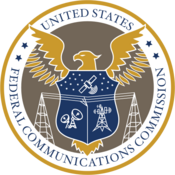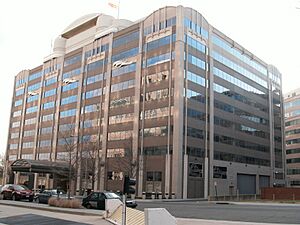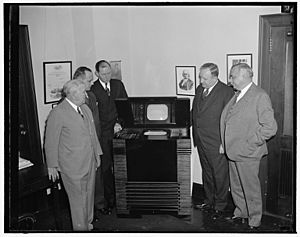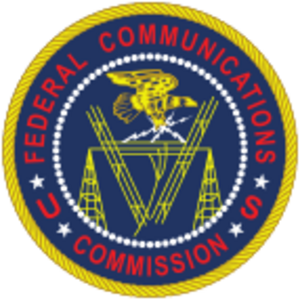Federal Communications Commission facts for kids

Official seal
|
|

Logo
|
|
| Agency overview | |
|---|---|
| Formed | June 19, 1934 |
| Preceding agency |
|
| Jurisdiction | Federal government of the United States |
| Headquarters | 45 L Street NE, Washington, D.C., U.S. 38°54′12″N 77°0′26″W / 38.90333°N 77.00722°W |
| Employees | 1,482 (2020) |
| Annual budget | $388 million (FY 2022, requested) |
| Agency executive |
|
The Federal Communications Commission (FCC) is an important agency of the United States government. It helps control how we communicate using radio, television, internet, Wi-Fi, satellite, and cable across the country. The FCC makes sure that everyone has access to communication services, that there is fair competition, and that our airwaves are used safely.
The FCC was created in 1934 by the Communications Act of 1934. It took over the job of regulating radio from an older agency called the Federal Radio Commission. It also started regulating wired communication, like telephones. The FCC works in all 50 states, Washington, D.C., and U.S. territories. It also works with similar groups in other North American countries. The FCC gets its money from fees, not taxes.
Contents
What the FCC Does: Its Main Goals
The FCC's main goal is to make sure that all people in the United States can get fast, good, and affordable communication services. This includes services like phone calls and radio. The FCC also works to make sure these services are available to everyone, no matter their background.
Another important goal of the FCC is to help with national defense. It also works to keep people safe and protect property by making sure wire and radio communications work well, especially during emergencies.
How the FCC Works
Leaders: The Commissioners
The FCC is led by five commissioners. The president of the United States chooses these commissioners, and the United States Senate must approve them. They usually serve for five years. One of the commissioners is chosen by the President to be the Chairman.
There can't be more than three commissioners from the same political party. Also, none of them can have a financial interest in any business that the FCC regulates. This helps keep things fair.
Departments: The Bureaus
The FCC has seven main departments, called "bureaus." Each bureau has a "chief" who is chosen by the FCC Chairman. These bureaus handle different tasks, like reviewing applications for licenses, looking into complaints, and creating rules.
- The Consumer & Governmental Affairs Bureau (CGB) helps protect consumers. It makes sure that communication services are accessible for people with disabilities. This bureau also answers questions and complaints from the public.
- The Enforcement Bureau (EB) makes sure that people and companies follow the FCC's rules. They work on protecting consumers, ensuring fair competition, and supporting public safety.
- The Media Bureau (MB) handles rules and licenses for electronic media, like cable television, broadcast television, and radio stations in the U.S.
- The Space Bureau (SB) deals with rules and licenses for satellites and communication from space. It also works with other government agencies on space policy. This bureau was created in April 2023.
- The Wireless Telecommunications Bureau manages wireless services, like mobile phones and other radio services. They also handle auctions for parts of the radio spectrum.
- The Wireline Competition Bureau (WCB) creates rules for traditional wired phone services. Their goal is to help wired technology grow and improve.
- The Public Safety and Homeland Security Bureau was started in 2006. It focuses on important communication systems that help with public safety and national security.
Support Teams: The Offices
The FCC also has twelve "offices" that provide support to the bureaus. These offices help with things like legal advice, finances, and public relations.
- The Office of General Counsel gives legal advice to the FCC. They also represent the FCC in court.
- The Office of Engineering and Technology (OET) advises the FCC on engineering matters. They manage the electromagnetic spectrum, which is like organizing all the different radio frequencies.
- The Office of International Affairs (OIA) works with other countries and international groups on communication rules.
- The Office of Media Relations (OMR) shares news and information from the FCC with the public and the media.
Where the FCC Works: Headquarters

The FCC's main office is in the Sentinel Square III building in Washington, D.C.. Before October 2020, the FCC was located in the Portals building, also in Washington, D.C.
A Look Back: History of the FCC

The Start: Communications Act of 1934
On February 26, 1934, President Franklin Roosevelt suggested creating the Federal Communications Commission. Later that year, Congress passed the Communications Act of 1934. This law created the FCC and gave it control over radio licensing and telecommunications.
The FCC first started working on July 17, 1934. It was divided into three main parts: Broadcasting, Telegraph, and Telephone.
Early Rules: Report on Chain Broadcasting
In 1941, the FCC released a report that led to big changes in radio. One major outcome was the breakup of the National Broadcasting Company (NBC), which helped create the American Broadcasting Company (ABC). The report also set limits on how much time networks could broadcast and dealt with conflicts of interest where networks acted as both agents and employers for artists.
The "Freeze" of 1948
After World War II, the FCC realized that many television stations were placed too close together, causing interference. Also, there weren't enough channels (2 through 13) for TV across the country. So, in October 1948, the FCC stopped giving out new TV station licenses. This was called the "Freeze."
The Freeze was supposed to last six months but ended up lasting until April 1952. During this time, the FCC worked on how to use new UHF technology and prepare for color television. The FCC's new plan, called the Sixth Report and Order, allowed new stations to be licensed starting July 1, 1952. This report also set aside channels for educational television.
Modernizing Communication: Telecommunications Act of 1996
In 1996, Congress passed the Telecommunications Act of 1996. This law aimed to create more competition in phone services. It also removed limits on how many radio and television stations one company could own across the country. This led to many radio stations being owned by fewer, larger companies.
People had concerns that this change might reduce the variety of voices and local content on radio and TV.
New Technology: Space Bureau Establishment in 2023
On January 4, 2023, the FCC decided to create a new Space Bureau and Office of International Affairs. This change was made to help the FCC work better with other government agencies and support the growing satellite industry. The Space Bureau officially started on April 11, 2023. It helps the FCC regulate Satellite Internet access.
FCC's Rules for Media
Radio and Television Broadcasting
The FCC sets rules for radio and television stations. Stations need licenses to broadcast, and these licenses are renewed if the station serves the "public interest." The FCC can fine stations or even take away their licenses if they break the rules.
Cable and Satellite Services
The FCC also has rules for cable and satellite television. These rules were first made in 1965 and have been updated over the years, especially with the Cable Communications Policy Act of 1984 and the Telecommunications Act of 1996.
Content Rules: Indecency
Broadcast TV and radio stations must follow FCC rules about indecency or obscenity. The Supreme Court has said that because radio airwaves are limited, the government can put some limits on what broadcasters can show or say. Cable and satellite providers also have some content rules, but they are not as strict as for broadcast stations.
In the early 2000s, the FCC increased its efforts to enforce indecency rules. In 2006, a new law called the Broadcast Decency Enforcement Act increased the fines for breaking these rules. The FCC can now fine stations up to $325,000 for each violation.
Media Ownership Rules
The FCC has rules about how many radio or TV stations one company can own across the country. It also has rules about owning a newspaper and a broadcast station in the same area. These rules are meant to ensure that many different viewpoints are shared and that local communities are served.
FCC's Rules for Wired Services
The FCC regulates wired communication services, like traditional telephone services. These rules make sure that companies offering these services provide them to all customers fairly.
Telephone Services
For many years, the FCC regulated telephone services as a single company, AT&T. This meant the FCC controlled phone rates and limited AT&T's profits.
In the 1960s and 70s, the FCC started allowing other companies to offer long-distance phone services. In 1982, a lawsuit led to the breakup of AT&T into several smaller companies. The FCC then worked to make sure all long-distance companies had equal access to local phone customers.
Internet Services
The FCC initially did not regulate internet services as strictly as phone services. However, in February 2015, the FCC decided to classify broadband internet access as a "telecommunications service." This change allowed the FCC to apply more rules to internet providers.
Net Neutrality
Net neutrality is the idea that internet service providers (ISPs) should treat all internet traffic equally. This means they shouldn't block or slow down certain websites or applications.
In 2005, the FCC set principles for an open internet. These principles said that consumers should be able to access any legal content, use any services, and connect any legal devices they choose. They also said there should be competition among internet providers.
In 2008, the FCC ruled against Comcast for slowing down certain internet traffic, like file-sharing. This case showed the need for clear rules about net neutrality.
In December 2010, the FCC created three main rules for the internet:
- Transparency: Internet providers must clearly explain their network practices.
- No blocking: Fixed internet providers cannot block legal content or applications. Mobile providers cannot block legal websites or apps that compete with their services.
- No unreasonable discrimination: Internet providers should not unfairly treat different types of internet traffic.
After some legal challenges, the FCC voted in February 2015 to apply stronger rules to internet providers to protect net neutrality. However, in December 2017, the FCC voted to repeal these rules.
More recently, in April 2024, the FCC voted again to bring back the net neutrality rules. This means internet providers are once again prohibited from blocking or limiting user access. However, on January 2, 2025, a court ruled that the FCC did not have the power to make these rules, saying that internet providers are "information service providers," not "telecommunications service providers."
FCC's Rules for Wireless Services
The FCC regulates almost all uses of radio frequencies in the United States. This includes mobile phones, amateur radio, and even wireless microphones.
Mobile Phone Services
Mobile phone companies are regulated by the FCC. This includes rules about how they use radio spectrum and how they provide services to customers.
Spectrum Auctions
Since 1994, the FCC has often sold licenses for parts of the radio spectrum through auctions. These auctions have raised billions of dollars for the U.S. government. The FCC usually gets spectrum for these auctions from other uses, like when TV broadcasters switched to digital signals.
Unlicensed Spectrum
Normally, you need an FCC license to send out radio signals. But the FCC has also set aside some parts of the spectrum for "unlicensed" uses. These are usually for low-power devices that work over short distances. This has allowed for the creation of many common technologies like wireless garage door openers, cordless phones, Wi-Fi, and Bluetooth.
Amateur Radio
People who operate Amateur radio (ham radio) in the U.S. must have a license from the FCC. The FCC sets the standards for the written tests, but volunteer groups actually give the exams. You don't need to know Morse code to get an amateur radio license anymore.
Public Involvement at the FCC
The FCC believes that public involvement is important when making communication policies. The FCC Record is a collection of the FCC's decisions and documents, published since 1986.
How the Public Can Get Involved
From its early days, the FCC (and its predecessor, the Federal Radio Commission) held public hearings. These hearings allowed people to share their opinions and help the commission understand different issues. In the past, not only broadcasters and engineers but also amateur radio operators and listeners' groups attended these hearings.
FCC leaders have often said that listening to the public, especially radio listeners, is very important. While public hearings are not always happening, they are sometimes organized to discuss important topics. For example, in 2023, Commissioner Nathan Simington held a public discussion on the social news site, Hacker News.
See also
 In Spanish: Comisión Federal de Comunicaciones para niños
In Spanish: Comisión Federal de Comunicaciones para niños
- International Telecommunication Union
- List of telecommunications regulatory bodies
|
 | James Van Der Zee |
 | Alma Thomas |
 | Ellis Wilson |
 | Margaret Taylor-Burroughs |



